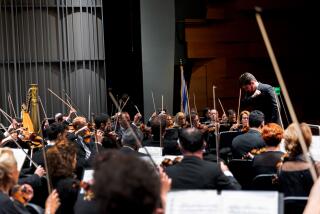MUSIC REVIEWS : ISRAEL’S YUVAL TRIO AT WILSHIRE EBELL
- Share via
The Yuval Trio from Israel took some time to disclose the full extent of its mastery--until the last work on the program, in fact--at an appearance for the Music Guild at the Wilshire Ebell Theatre on Wednesday.
On a program top-heavy with the Romantic effusions of Brahms’ Trio in C, Opus 87, and the Trio in D minor, Opus 32, by Anton Arensky, the most forward-looking music was provided by Beethoven, in the form of his “Ghost” Trio, Opus 70.
In Beethoven and Brahms, the propulsiveness and leadership one expected of pianist Jonathan Zak was in short supply. Zak, although the most fluent of technicians, too often receded into the background, while his no less accomplished but more overtly emotional colleagues, violinist Uri Pianka and cellist Simca Heled, provided the action.
A measure of dynamic and emotional reticence proved beneficial to the Brahms. Still, while being able to admire the strength of Pianka’s and Heled’s interplay here, a forceful keyboard presence was only fleetingly apparent.
But, oh what a way to end a program! Arensky, a contemporary and obvious admirer of Tchaikovsky’s, may be a minor figure, but his D-minor Trio, with its succulent tunes and lively, unexpected rhythms--Malaga and Moscow meet head-on in the scherzo’s whirligig trio section--is a major source of pleasure.
Arensky’s delectably excessive work is more a series of star turns than a balanced ensemble composition, and in it each of the Yuval members shone brilliantly: Pianka and Heled with their expected passion and sweetness of tone; Zak, a boldness of attack, a quite astonishing dynamic range and variety of tone--all of which had the large Music Guild audience cheering, whistling and stomping its approval.
More to Read
The biggest entertainment stories
Get our big stories about Hollywood, film, television, music, arts, culture and more right in your inbox as soon as they publish.
You may occasionally receive promotional content from the Los Angeles Times.









